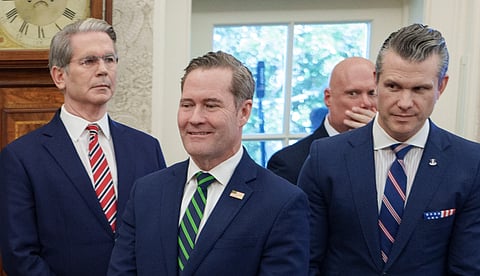

U.S. National Security Adviser Mike Waltz has admitted full responsibility for creating a Signal group chat in which high-ranking officials discussed imminent military strikes in Yemen—only to inadvertently include a journalist who later exposed the sensitive exchanges.
Waltz’s acknowledgment came Tuesday, a day after The Atlantic’s editor-in-chief, Jeffrey Goldberg, revealed he had been mistakenly added to the private chat, where he observed classified military plans and candid criticisms of European allies by top U.S. officials. Signal, the encrypted messaging app used for the discussions, is not authorized for sharing classified information, and the Pentagon recently warned staff against its use.
"I take full responsibility. I built the group," Waltz told Fox News, calling the lapse "embarrassing." However, he suggested the error could have resulted from a "technical" issue or even deliberate manipulation by Goldberg—claims for which he provided no evidence.
Goldberg’s report detailed how officials, including Defense Secretary Pete Hegseth and Vice President JD Vance, privately scorned European nations for what they deemed insufficient contributions to global security.
"I fully share your loathing of European free-loading. It’s pathetic," Hegseth reportedly wrote, arguing that U.S.-led strikes on Houthi targets in Yemen would disproportionately benefit European trade routes. Vance, questioning the urgency of the operations, added: "I just hate bailing Europe out again."
Officials also debated compelling Europe to financially support U.S. efforts to secure Red Sea shipping lanes, according to the leaked messages.
Waltz could not explain how Goldberg was added to the chat, insisting he did not know the journalist and that an unnamed contact was supposed to be included instead. His account contradicted President Donald Trump, who earlier alleged a lower-level staffer in Waltz’s office had shared Goldberg’s number.
Trump downplayed the incident as a "minor glitch," while intelligence leaders, including Director of National Intelligence Tulsi Gabbard and CIA Director John Ratcliffe, denied any classified material was compromised—despite Goldberg’s report citing precise strike details.
The mishap has drawn sharp rebukes from lawmakers and watchdog groups. Sen. Mark Warner (D-Va.), vice-chair of the Senate Intelligence Committee, called it evidence of a "sloppy and grossly incompetent national security strategy." Meanwhile, the nonpartisan group American Oversight filed a lawsuit accusing participants of violating federal record-keeping laws by enabling auto-deletion of messages.
The National Security Agency had flagged Signal’s vulnerabilities in an internal warning last month, according to documents obtained by CBS News. Waltz said "technical minds" were investigating the breach and claimed he had sought assistance from Elon Musk.
When pressed on how Goldberg’s number appeared, Waltz offered only a vague explanation: "If you have somebody else’s contact, then somehow it … gets sucked in."
The fallout underscores mounting scrutiny over the administration’s handling of sensitive communications—and its strained rapport with European allies.